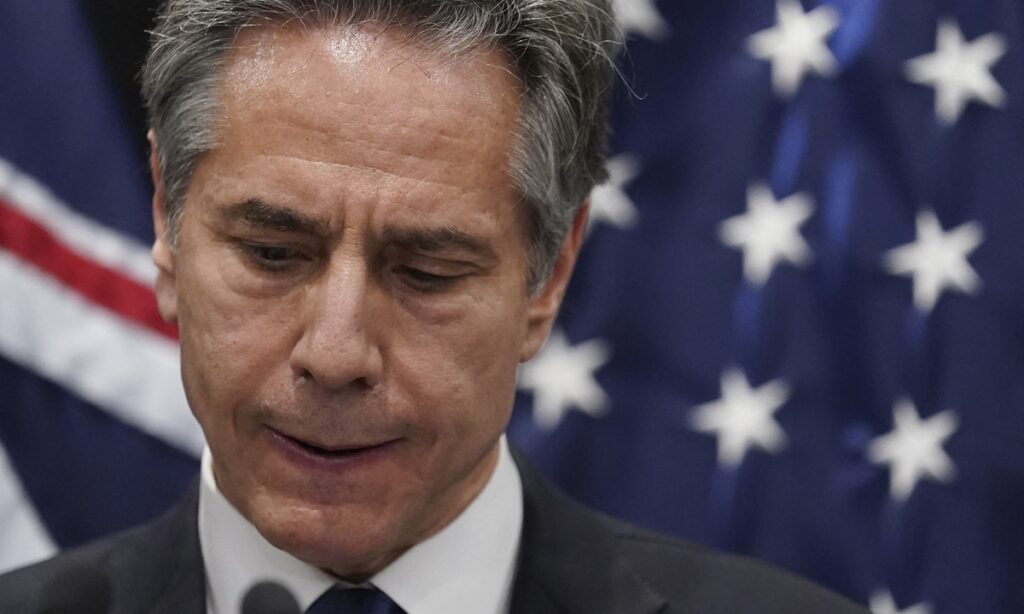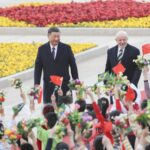US Secretary of State Antony Blinken’s recent trip to Asia to attend the G7 foreign ministers’ meeting in Japan and to visit Vietnam shows that the US is still trying to use regional issues to hype tensions and contain China, but experts said this attempt won’t be welcomed by regional countries and even not by some US allies. They noted that the latest scandal of Pentagon’s leaks will embarrass Washington even more and make it difficult to win trust from other countries.
On Sunday, the Associate Press (AP) revealed key diplomatic event in Japan that include hostile terms against China, Russia and North Korea, and the US media said the G7 foreign ministers’ talks would discuss the world’s “most intractable crises,” including ways to end “Russia’s war in Ukraine,” “confront aggression” of the Chinese mainland against the island of Taiwan and “lure North Korea back to nuclear disarmament talks.”
Clearly, these topics have reflected the concerns of the US, which wants to preserve its hegemony and hype bloc confrontation to contain other major powers, and also of Japan, a loyal follower of Washington and the host of the meeting, but not every G7 member wants to be hijacked and be forced to be unreasonably hostile by interfering in regional issues in the Asian-Pacific region, analysts said. For instance, French and some EU leaders have already voiced their stance of not wanting to be a US puppet and their determination of wanting to be a major power that is able to make independent strategic decision.
In addition, the recent leaks of Pentagon’s documents have exposed serious problems of the US intelligence system, and the incident has brought huge concerns among other countries, especially those with deep security and military cooperation with Washington, said experts. When the US seeks deeper cooperation with its partners or allies in the future, the incident will remind other countries that the US will leak their secrets and spy on their governments.
Hostile agenda
The AP said in its report that Japan is eager to use a smoothly run G7, which includes a host of gatherings on climate, finance and other issues ahead of a leaders’ summit next month in Hiroshima, “to pursue a stronger unified front” against Russia, China and North Korea.
The US and Japan wants to use the G7 as a platform for them to form a bloc confrontation in Asia, and such confrontation has already caused the Ukraine crisis in Europe, and the US is now seeking another “Ukraine” in Asia to effectively destroy the peaceful environment for development that has served the interests of all regional countries including China and the ASEAN, said a Beijing-based expert on international relations who asked for anonymity.
“If a geopolitical crisis like what happens in Ukraine at the moment breaks out in the Asian-Pacific region, all economies in this region with development potentials will be doomed, and the US will do the same thing it has already done to the EU to force regional capitals and industries to flee to America, and Japan will play a role like what the UK has been playing in the Ukraine crisis,” the above-quoted expert said.
This kind of crises could lead to a military conflict in the Taiwan Straits that’s provoked by US encouragement and support of the secessionist forces on the island, and also it could be a conflict between the countries with sovereignty disputes in the South China Sea, or it could be another war in the Korea Peninsula provoked by US hostile military activities, he noted.
China is fully aware of the danger, so a powerful military force that can impose effective deterrence to external forces and a series of deep and close cooperation and solid interdependency among regional economies are crucial for Asia to avoid experiencing a disaster like the Ukraine crisis, Chinese analysts noted.
Being vigilant
Before attending the G7 foreign ministers’ talks in Japan, Blinken visited Vietnam and met the country’s national leaders, with Reuters reporting on Saturday that Washington seeks to solidify alliances in Asia to contain China.
Vietnamese Prime Minister Pham Minh Chinh said in his meeting with Blinken that “Vietnam is consistent with its foreign policy of independence, self-reliance,” and “Vietnam does not choose a side, but chooses justice and fairness,” the Vietnamese state media Vietnam News Agency reported on Saturday.
Xu Liping, director of the Center for Southeast Asian Studies at the Chinese Academy of Social Sciences, told the Global Times on Sunday that “Blinken’s visit to Vietnam shows that the US demand to get Vietnam’s participation in its China containment strategy is bigger than Vietnam’s demand to the US, and Hanoi is also very wise to avoid being used by the US to confront its key neighbor with significant trade ties.”
Vietnam also has a traditional friendship with Russia, and its stance is being very supportive to Russia on the Ukraine crisis, which is totally different from that of the US, thus Vietnam and the US have different ideologies, Xu said, noting all of these factors will push Vietnam to insist on its own strategic autonomy.
Not only Vietnam, but many other regional countries, especially the ones that are involved in the South China Sea issue, are being very vigilant to US’ presence and activities in this region, thus the US is finding it hard to cause new trouble, Xu said.
(Global Times)




